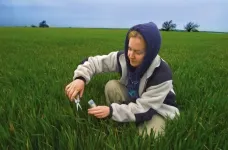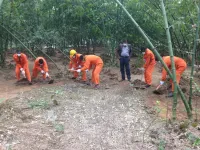Hard to crack research reveals how crop roots penetrate hard soils
2021-01-14
(Press-News.org) Scientists have discovered a signal that causes roots to stop growing in hard soils which can be 'switched off' to allow them to punch through compacted soil - a discovery that could help plants to grow in even the most damaged soils.
An international research team, led by scientists from the University of Nottingham's Future Food Beacon and Shanghai Jiao Tong University has discovered how the plant signal 'ethylene' causes roots to stop growing in hard soils, but after this signal is disabled, roots are able to push through compacted soil. The research has been published in Science.
Hard (compacted) soils represent a major challenge facing modern agriculture that can reduce crop yields over 50% by reducing root growth, causing significant losses annually. Europe has over 33-million-hectares of soil prone to compaction which represents the highest in the world. Soil compaction triggers a reduction in root penetration and uptake of water and nutrients. Despite its clear importance for agriculture and global food security, the mechanism underpinning root compaction responses has been unclear until now.
Professor Malcolm Bennett from the University of Nottingham School of Biosciences, said: "Understanding how roots penetrate hard soils has huge implications for agriculture, as this knowledge will be crucial for breeding crops more resilient to soil compaction. Our team's identification that the plant signal ethylene controls root responses to hard soil opens up new opportunities to select novel compaction resistant crops."
The research utilised X-ray Computed Tomography scanners available at the Hounsfield Facility at the University of Nottingham to visualise in situ how plant roots responded to compacted soil. Professor Sacha Mooney from the University of Nottingham and Director of the Hounsfield Facility explained: "Prior to this research we assumed that the hardness of the soil prevented roots growing deeper. By using our imaging approach, we were able to see that roots continued growing in very hard soils when the ethylene signal was switched off. The potential for new crops that can now go deeper in soils and capture previously unavailable resources is really exciting!"
The international team involved in this new Science paper includes researchers drawn from nine universities based in Europe, China and USA, integrating expertise spanning plant and soil sciences, bioimaging and mathematics. The team involves several early career researchers including Dr. Bipin Pandey and Dr. Rahul Bhosale who are funded by Royal Society Challenge Grant, BBSRC Discovery Fellowship and University of Nottingham Future Food Beacon awards.
INFORMATION:
ELSE PRESS RELEASES FROM THIS DATE:
2021-01-14
CAMBRIDGE, MA -- One reason it's so difficult to produce effective vaccines against some viruses, including influenza and HIV, is that these viruses mutate very rapidly. This allows them to evade the antibodies generated by a particular vaccine, through a process known as "viral escape."
MIT researchers have now devised a new way to computationally model viral escape, based on models that were originally developed to analyze language. The model can predict which sections of viral surface proteins are more likely to mutate in a way that enables viral escape, and it can also identify sections that are less likely to mutate, making them good targets ...
2021-01-14
As the story goes, the Greek mathematician and tinkerer Archimedes came across an invention while traveling through ancient Egypt that would later bear his name. It was a machine consisting of a screw housed inside a hollow tube that trapped and drew water upon rotation. Now, researchers led by Stanford University physicist Benjamin Lev have developed a quantum version of Archimedes' screw that, instead of water, hauls fragile collections of gas atoms to higher and higher energy states without collapsing. Their discovery is detailed in a paper published Jan. 14 in Science.
"My expectation for ...
2021-01-14
If you asked people which group of animals is the most abundant on earth, hardly anyone would know the right answer. Ants? Fish? No, and not humans either. The answer is nematodes, also known as roundworms. Four out of five animals on earth belong to this group, and the reason hardly anyone is aware of the fact is that they live underground, invisible to us. Together with thousands of other soil organisms, they quietly, discreetly and constantly perform enormously important services for the world above them.
The soil is one of the most species-rich habitats in existence. Living under one square meter ...
2021-01-14
The human body is like a construction site where hundreds of thousands of different molecular nanomachines, called proteins, are simultaneously at work. Each one of these biomolecules, which are chains of amino acids essential to living organisms, perform a different biological function, often in synergy with other proteins. During their formation (the folding process) or in the performance of their biological functions, proteins change their shape in a very specific way. In many cases it is possible to conduct experiments that provide images of proteins at near atomic resolution, but only when they are in the stable and biologically ...
2021-01-14
New research from CU Cancer Center member Jing Hong Wang, MD, PhD, and recent University of Colorado Immunology program graduate Rachel Woolaver, PhD, may help researchers develop more effective personalized immunotherapy for cancer patients.
Working within Wang's specialty of cancer immunology and head and neck squamous cell carcinomas (HNSCCs), the researchers worked to establish a mouse model that would help them understand why some hosts' immune systems reject tumors easily, while others have a harder time doing so. Their research was published last week in the Journal for ImmunoTherapy of Cancer.
"It's particularly interesting now because the field of cancer treatment has really been going in the direction of immunotherapy, ...
2021-01-14
Researchers at the UC Davis Violence Prevention Research Program (VPRP) assessed the prevalence of exposure to violence, such as robbery or assault, and its impacts on the mental health and social functioning of California adults. Their study, published in the Journal of Interpersonal Violence, shows the far-reaching psychological effects an incident of gun violence can have on victims and those close to them.
The study's findings are based on data from 2,558 adults who responded to the 2018 California Safety and Wellbeing Survey (CSaWS). CSaWS is an ongoing survey research project on firearm ownership and the consequences of exposure to violence in California. Responses were weighted to be statistically representative of the state's adult population.
These ...
2021-01-14
Primer on Carbon Dioxide Removal Provides Vital Resource at Critical Time
--By Julie Chao
Scientists say that any serious plan to address climate change should include carbon dioxide removal (CDR) technologies and policies, which makes the newly launched CDR Primer an especially vital resource, says Berkeley Lab scientist Margaret Torn, one of about three dozen scientists who contributed to this document.
"Atmospheric CO2 concentrations are already 50% over historic natural levels - 270 ppm (parts per million) in pre-industrial times vs 414 ppm today," said Torn. "To slow climate change and avoid its worst impacts, climate scientists tell ...
2021-01-14
MADISON, Wis. -- As a new, apparently more transmissible version of the virus that causes COVID-19 has appeared in several countries, new research finds that the transmissibility of viral strains and the population density of a region will play big roles in how vaccination campaigns can help towns and cities return to more normal activities.
The findings suggest that directing vaccines toward densely populated counties would help to interrupt transmission of the disease. Current vaccination distribution plans don't take density into account.
Tony Ives at the University of Wisconsin-Madison and Claudio Bozzuto of the independent data research company Wildlife ...
2021-01-14
Researchers from the University of Cambridge, the University of Milan and Google Research have used machine learning techniques to predict how proteins, particularly those implicated in neurological diseases, completely change their shapes in a matter of microseconds.
They found that when amyloid beta, a key protein implicated in Alzheimer's disease, adopts a highly disordered shape, it actually becomes less likely to stick together and form the toxic clusters which lead to the death of brain cells.
The results, reported in the journal Nature Computational Science, could aid in the future development of treatments ...
2021-01-14
Decades after the industrialized world largely eliminated lead poisoning in children, the potent neurotoxin still lurks in one in three children globally. A new study in Bangladesh by researchers at Stanford University and other institutions finds that a relatively affordable remediation process can almost entirely remove lead left behind by unregulated battery recycling - an industry responsible for much of the lead soil contamination in poor and middle-income countries - and raises troubling questions about how to effectively eliminate the poison from children's bodies.
"Once the lead is in the environment, it stays there pretty much indefinitely ...
LAST 30 PRESS RELEASES:
[Press-News.org] Hard to crack research reveals how crop roots penetrate hard soils

